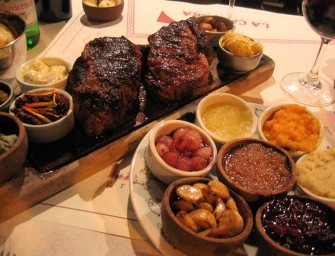Main Name: Brussels Sprouts
Biological Name: Brassica Oleracea
Names in Other Languages: Col de Bruselas (Spanish), Choux de Bruxelles (French), Choti Gobhi (Hindi), Kalakose (Tamil), Mara Kosu (Kannada)
Biological Name: Brassica Oleracea
Names in Other Languages: Col de Bruselas (Spanish), Choux de Bruxelles (French), Choti Gobhi (Hindi), Kalakose (Tamil), Mara Kosu (Kannada)
There’s a misconception that any food high in nutrient value and providing unmatchable health benefits, does not taste good! A majority of population, no matter how acquainted they are with the existence of Brussels sprouts and their advantages, will have a frown on their face if a meal is made out of them. But these sprouts, when cooked properly, can be made to taste delicious. Read further for some information about its history, health benefits, choosing Brussels sprouts and preparing certain mouth-watering dishes out of them.
History
Although the first written account of Brussels sprouts was in 1587, predecessors of ancient Rome in the early 13th century in Belgium starting cultivating it. The variety of Brussels sprouts that we eat today was cultivated in Belgium in the 16th century from where it spread to rest of the Europe including Netherlands. After gaining popularity, it was introduced in the United States by French settlers, who grew them in Louisiana in the 18th century. However, much of this cabbage-lookalike was consumed only during the 20th century. Today, it is grown in coastal areas of San Mateo, Santa Cruz, California, Mexico and Canada. Continental Europe with Netherlands, Germany and United Kingdom are its largest producers. In India, Brussels sprouts are grown in limited quantity since the cultivation area is scattered across the country.
Although the first written account of Brussels sprouts was in 1587, predecessors of ancient Rome in the early 13th century in Belgium starting cultivating it. The variety of Brussels sprouts that we eat today was cultivated in Belgium in the 16th century from where it spread to rest of the Europe including Netherlands. After gaining popularity, it was introduced in the United States by French settlers, who grew them in Louisiana in the 18th century. However, much of this cabbage-lookalike was consumed only during the 20th century. Today, it is grown in coastal areas of San Mateo, Santa Cruz, California, Mexico and Canada. Continental Europe with Netherlands, Germany and United Kingdom are its largest producers. In India, Brussels sprouts are grown in limited quantity since the cultivation area is scattered across the country.

http://www.notonthehighstreet.com/thecontemporaryhome/product/heart-shaped-brussel-sprout-wreath
Health Benefits of Brussels Sprouts
- The high fiber content in Brussels sprouts aids in digestion and prevents constipation. It also assists in keeping a check on the increase of appetite.
- Consumption of this leafy vegetable not only helps in maintaining the blood sugar but it also lowers cholesterol levels that in turn lessen the possibility of an arterial blockage.
- According to recent studies, certain compounds present in Brussels sprouts block the activity of sulphotransferase enzymes that are known to be detrimental to the health and stability of DNA within the white blood cells.
- Glucobrassicin, a glucosinolate found in Brussels sprouts, and omega-3 fatty acids have been shown to fight inflammation on a genetic level.
- Further, the glucosinolates produce isothiocyanates that are shown to fight various types of cancers such as bladder, breast, colon, lung, prostate and ovarian. The sulforaphane present in Brussels sprouts blocks the growth of the Helicobacter pylori bacteria, which can lead to gastric cancer. Together, these compounds regulate inflammation within the body and prevent any risk of heart attacks and arteriosclerosis.
- The high levels of vitamin K present in Brussels sprouts promote healthy bones and thus preventing calcification of body tissues. This vitamin also serves as an anti-inflammatory agent and is essential for proper brain and nerve functioning.
- The vitamin C content in Brussels sprouts ensures a healthy immune system, lowers blood pressure, fights against cataract and hypertension and prevents the formation of cellular rust that may lead to atherosclerosis and heart diseases.
- Protection against macular degeneration, prevention of urinary stones, maintaining healthy bones and teeth and a boosted immunity is all triggered by vitamin A present in Brussels sprouts.
Brussels Sprouts Nutrition FactsAmount: 1
Total Weight: 85 g
Total Weight: 85 g
| Nutrients | Amount |
| Basic Components | |
| Proteins | 3 g |
| Water | 74.22 |
| Ash | 0.80 |
| Calories | |
| Total Calories | 37 |
| Calories From Fats | 2.1 |
| Calories From Carbohydrates | 27 |
| Calories From Proteins | 7 |
| Carbohydrates | |
| Total Carbohydrates | 7.6 g |
| Dietary Fiber | 3.2 g |
| Sugar | 1.9 g |
| Fats & Fatty Acids | |
| Total Fat | 255 mg |
| Saturated Fat | 53 mg |
| Monounsaturated Fat | 20 mg |
| Polyunsaturated Fat | 130 mg |
| Omega-3 Fatty Acids | 84 mg |
| Omega-6 Fatty Acids | 38 mg |
| Vitamins | |
| Vitamin A | 641 IU |
| Vitamin C | 72 mg |
| Vitamin E | 748 mcg |
| Vitamin K | 150 mcg |
| Thiamin | 118 mcg |
| Riboflavin | 77 mcg |
| Niacin | 633 mcg |
| Folate | 52 mcg |
| Panto Acid | 263 mcg |
| Vitamin B6 | 186 mcg |
| Minerals | |
| Calcium | 36 mg |
| Iron | 1.2 mg |
| Magnesium | 20 mg |
| Sodium | 21 mg |
| Potassium | 331 mg |
| Phosphorus | 59 mg |
| Zinc | 35 mcg |
| Copper | 60 mcg |
| Manganese | 286 |
| Selenium | 1.4 mcg |

http://whataboutthis.biz/tag/brussels-sprouts-on-the-stalk/
How many calories in Brussels Sprouts (per 100 gm)
Brussels sprouts have about 41 calories per 100 gm of weight.
How to Buy Brussels Sprouts
- Brussels sprouts are best acquired from a farm. But in case you are purchasing it from a supermarket, it is advisable to learn whether the stock is fresh or not.
- Remember to pick only those sprouts which are firm, compact and vividly green in colour. Those that are soft or puffy are usually poor in quality. Also, make sure that the stem is clean and not discoloured.
- Avoid sprouts with yellow coloured formations or wilted leaves as they are aged. Observe closely for any perforations in the sprouts, as this might be a sign of infestation.
- The aroma from the Brussels sprouts is also important in choosing the perfect ones. The older ones will have a strong cabbage-like odour. It is recommended to these leafy veggies individually rather than in bulk or pre-packaged boxes.
Brussels Sprouts Storage Tips
- Unwashed and uncut Brussels sprouts can be put inside a plastic bag and then stored in refrigerator for a period of 3-5 days. But make sure to remove any wilted or discoloured leaves.
- Brussels sprouts can be stored inside the freezer too for almost a period of one year. However, it is recommended that you blanch them for 3-5 minutes before freezing them.
- Cooked Brussels sprouts can also be stored in an air-tight container in cold storage but they have to be consumed within 2-3 days.



